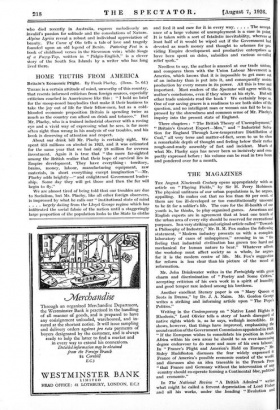HOME TRUTHS FROM AMERICA
Britain's Economic Plight. By Frank Plachy, (Berm. 7s. 6d.) THERE is a certain attitude of mind, unworthy of this country, that resents informed criticism from foreign sources, especially criticism couched in Americanese like this : " I hold no brief for the-snoop-nosed busybodies that make it their business to take the joy out of life for their fellow-men, but as a cold- blooded economic proposition Britain is spending twice as much as the country can afford on drink and tobacco." But Mr. Plachy, who is a trained industrial observer with a roving eye and a vivid way of expressing what he sees, is far more often right than wrong in his analysis of our troubles, and his book is deserving of attention and respect.
About our drink bill Mr. Plachy is certainly right. We spent 315 millions on alcohol in 1925, and it was estimated for the same year that we had only 28 million for oversee investment. Again it is true that " the more far-sighted among the British realize that their hope of survival lies in Empire development. They have everything : territory, brains, money, labour, manufacturing equipment, raw materials, in short everything except imagination "—Mr. Plachy adds brightly—" and enlightened Government leader- ship. Some day they will get those and then the fur will begin to fly."
We are almost tired of being told that our troubles are due to Socialism, but Mr. Plachy, like all other foreign observers, is impressed by what he calls our " institutional state of mind . . . . largely dating from the Lloyd George regime which has infiltrated the social fabric of the nation until a staggeringly large proportion of the population looks to the State to clothe and feed it and care for it in every way The accept
ance of a large volume of unemployment is a case in point It is taken with a sort of fatalistic inevitability, whereas at least half of it would be wiped out if the Government had devoted as much money and thought to schemes for pro. viding Empire development and productive enterprises as have been spent on doles, subsidies and various so-called relief work."
Needless to say, the author is amazed at our trade unions, and compares them with the Union Labour Movement in America, which knows that it is impossible to get more out of an industry than is put into it, and consequently assists production by every means in its power. All this is true and important. Most readers of the Spectator will agree with the 'author's conclusions, even if they wince at his style. Butvrill other trade unionists read the book '1 We certainly hope so, One of our saving graces is a readiness to see both sides of the question, and no intelligent man or woman can fail to be in. pressed by the shrewdness and common sense of Mr. Plachy's inquiry into the present state of England.
Three chapters : " The British Theory of Unemployment," " Britain's Greatest Export—Men," and " Industrial Salve. tion for England Through Low-temperature Distillation of Coal," all very terse and matter-of-fact, seem to us to show a remarkable depth of thought and feeling below their rather rough-and-ready assembly of fact and incident. Much of what Mr. Plachy says has never been so incisively and cont. pactly expressed before : his volume can be read in two hours and pondered over for a month.






































 Previous page
Previous page